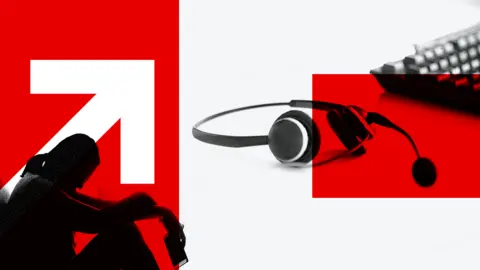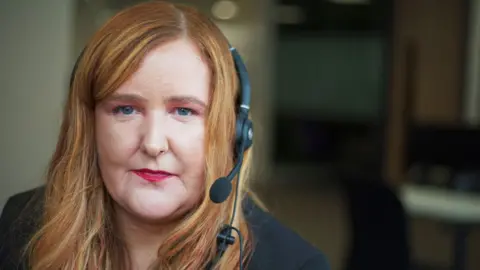‘I’ve got nothing’: A day with a debt helpline
 BBC
BBCThe food in the fridge has gone off, there's no hot water and the TV won't switch on.
"I've got nothing," says Emma, a domestic abuse survivor in her early twenties.
Emma (not her real name) has no gas or electricity in her supported accommodation, and is phoning a financial charity for advice.
A debt adviser answers her call.
"Hello, you're through to StepChange. My name is Lynsey Muff, how can I help?"
Emma talks Lynsey through her budget - her bills, food, travel and clothing costs. She says she has about £216 a month to live on once the utility company has taken its advance from her Universal Credit benefit payment. Her food budget is about £10 a week, and she needs emergency credit to put on the prepayment meter.
Getting Emma more food is the most urgent problem, and Lynsey directs her to Citizens Advice where she will be given a voucher that she can take to a food bank.
She is also referred to the local council, and Lynsey tells her about other benefits she could be entitled to that could boost her income, including discretionary housing payments, a personal independence payment, or an addition to her Universal Credit for health conditions.
They also decide to pass on Emma's budget to the utility company to show why she can't afford to pay that amount every month.

StepChange will work with Emma on longer-term debt solutions, but for now this conversation is brought to an end. At the call centre in Leeds, Lynsey, hangs up.
"Nearly every call is an emergency situation," she says, while glancing at her screen where dozens more callers wait in the phone queue.


Lynsey is 44 and from Bradford. She has worked at StepChange for four years and says the number of urgent requests like Emma's has increased rapidly.
"It's hectic and hard going. But we wouldn't be here if we didn't care." Soon, Lynsey's phone rings again.
"How can I help?" she asks.
Olivia (not her real name) has just found out that she has cancer.
Lynsey asks Olivia whether her cancer is terminal, because StepChange has another department who can help if that is the case.
Although it isn't, Olivia is stressed and worried about claiming sick pay as well as benefits.
Her energy supplier is going to increase her gas and electricity bills from £150 to £350 a month. And together with mortgage arrears, bank loans and credit card debt, this will put her in a "massive" minus budget.
Despite going through chemotherapy, Olivia tells Lynsey she wraps herself up to keep warm, rather than putting the heating on.
"If you've gone from earning £1,500 a month to £96 a week, that's a big drop," Lynsey says.
Lynsey reassures Olivia that something can be done and explores different options to make sure she gets everything she is entitled to, like council tax benefit.
"We're like a guide because they don't know what's out there in terms of benefits or debt solutions. We're giving them that knowledge and finding a solution tailored to them," Lynsey says.
The call ends and Lynsey puts the phone down.
"That was a tough one, it broke my heart," she says. "Because she's lost her hair she's going to feel the cold more - to think of somebody not putting the heating on because they're scared to, that stays with you."
As winter approaches, Lynsey worries that things could get more difficult for many people.
"I think it's going to be carnage, really grim. We're going to see more families that have never had debt in their life," she says.
Another call comes in - this time parents earning minimum wage and still running at a minus budget.
The couple have asked their family and friends to pay for food, have considered getting rid of their car to save money, and are unable to pay for school uniforms for their three children.
"Using a credit card to top up that minus budget each month, we have to be realistic. If I wave a magic wand and wipe all your debt off, you're still going to be minus each year. It's a vicious cycle," Lynsey explains.

Where to get help
Information and support is available if you have money concerns or are in debt - click here to find out about organisations who may be able to help

But for some callers, there are more positive outcomes.
One older man, who had cancer and a heart attack, was granted a debt relief order and that changed his situation.
"He followed the advice and he's now debt free," Lynsey says with a beaming smile. "He phoned to say thank you. It gets rid of all that stress and worry. That to me is massively impacting people, it's fabulous."
At 17:00, Lynsey closes her laptop and leaves the call centre.
"It can be tough and very busy, but it's rewarding because I've helped so many people - I'm making a difference," she says.
"I don't think about tomorrow. You've just got to see what that day brings. We could get any call - a suicidal client or somebody ringing us to say thank you - it's a mixed bag.
"I hope things get better."


What is your experience of the cost of living crisis? What are your questions about it? Email your stories and questions to: [email protected].
Please include a contact number if you are willing to speak to a BBC journalist. You can also get in touch in the following ways:
- WhatsApp: +44 7756 165803
- Tweet: @BBC_HaveYourSay
- Or fill out the form below
- Please read our terms & conditions and privacy policy
If you are reading this page and can't see the form you will need to visit the mobile version of the BBC website to submit your question or comment or you can email us at [email protected]. Please include your name, age and location with any submission.

